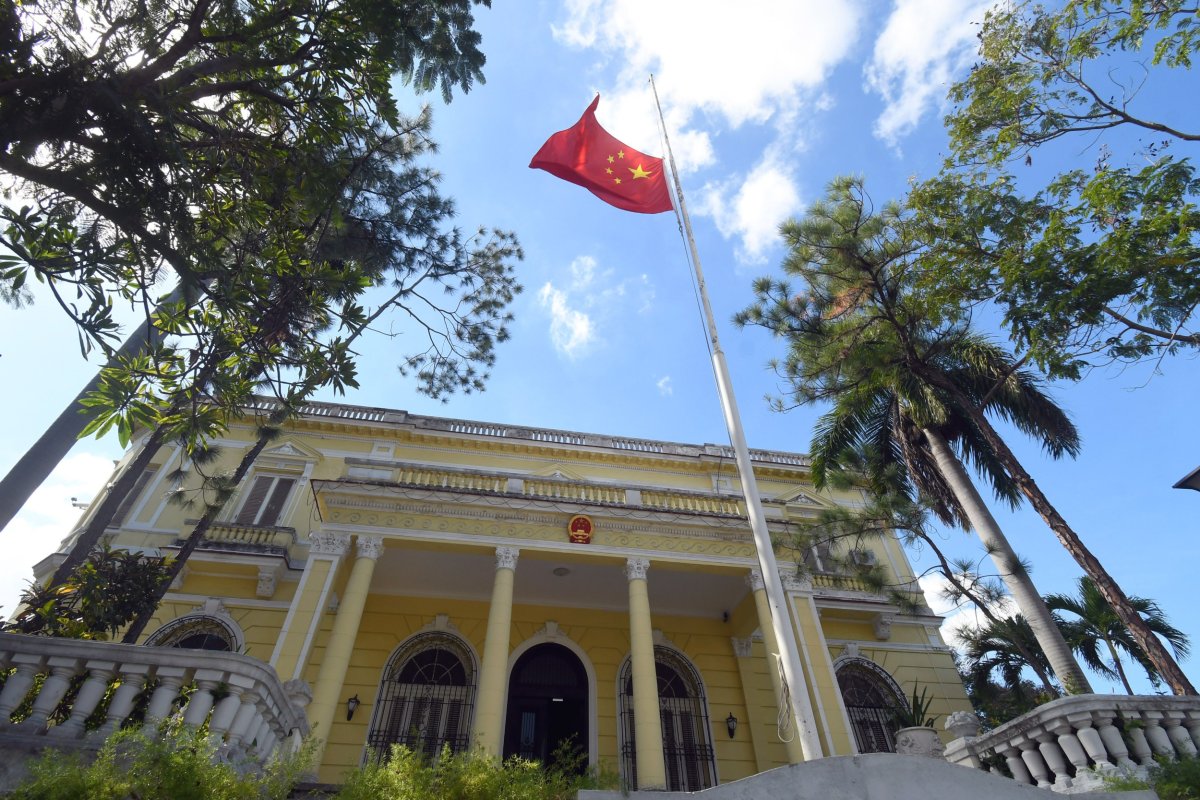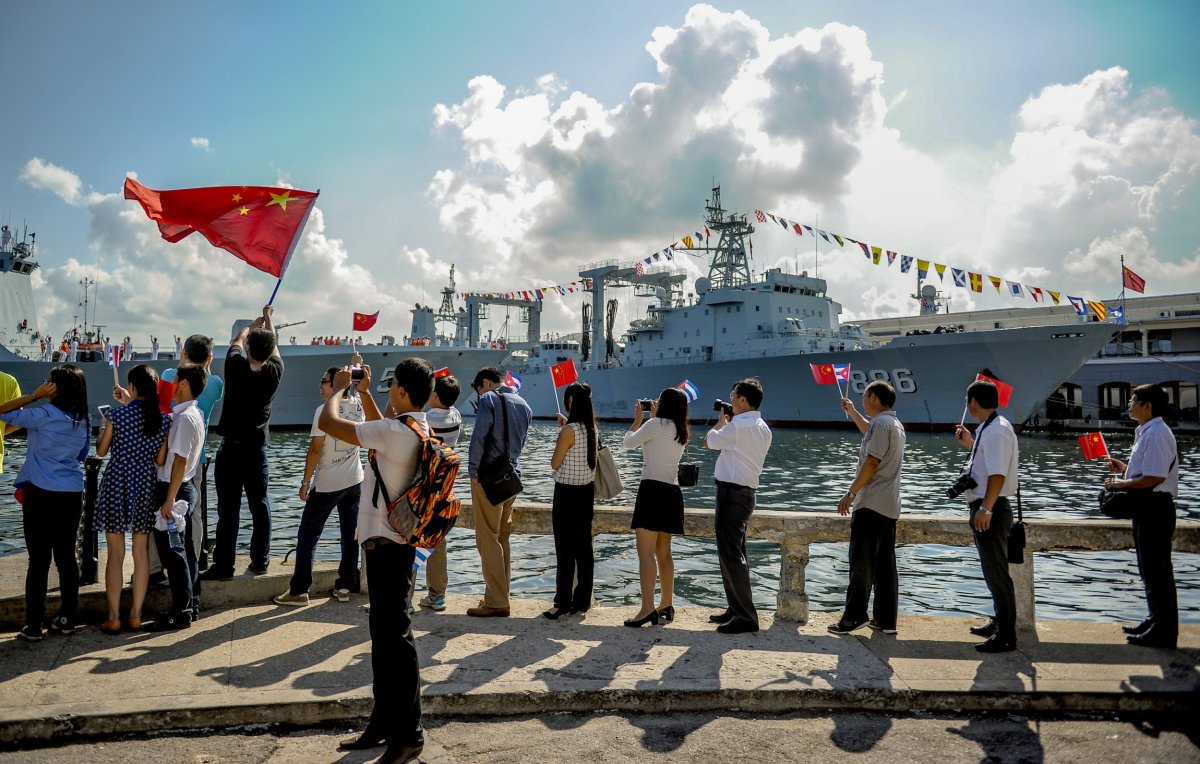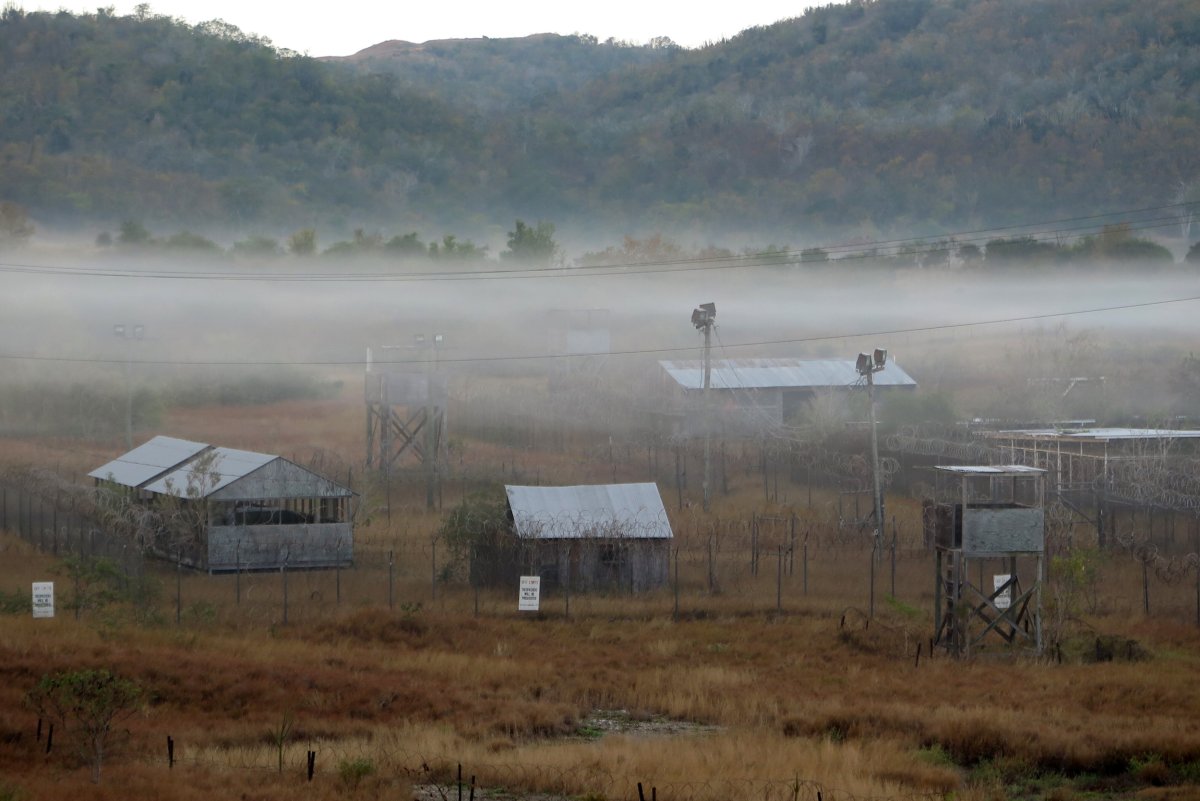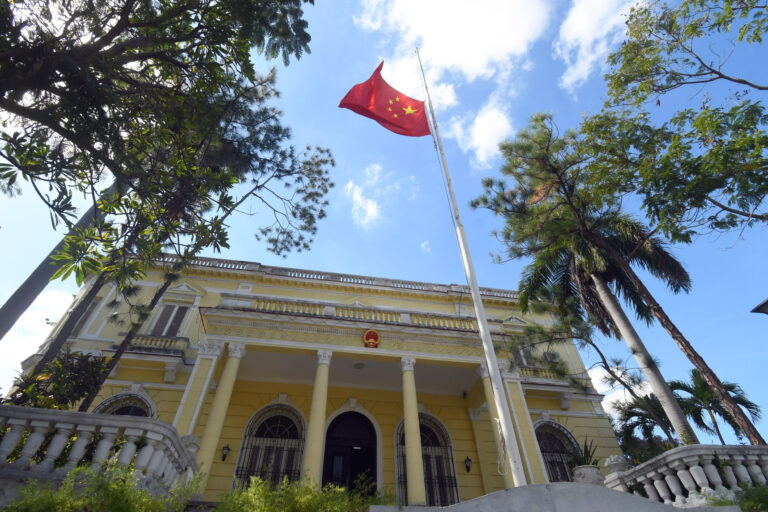A senior Cuban diplomat has expressed his nation’s commitment to further boosting ties with China but ruled out the possibility of hosting any foreign military bases, even as an intensifying geopolitical feud between China and the United States comes to the Caribbean.
On the heels of a Newsweek investigation that revealed previously unseen details regarding Chinese dealings with the tiny Caribbean island nation of Antigua, Cuban Deputy Foreign Minister Carlos Fernández de Cossío told Newsweek that “we don’t know of any hostile act against the U.S. by China in the region.”
“We know it is mentioned by a lot by the U.S., but, of course, unless there is information that sustains we don’t know about those allegations, we don’t have access to the evidence that could exist,” de Cossío said. “As far as we know, they pursue business as any country pursues business and just competition.”
And when it comes to Cuba, specifically, he dismissed U.S. media reports that emerged last year regarding the alleged presence of a Chinese spy base operating since at least 2019. He asserted that not a single diplomat among more than 100 accredited embassies and missions in Cuba has produced evidence regarding the alleged installation.
President Joe Biden’s administration has yet to publicly back the allegations, though U.S. officials continue to scrutinize the rise of China’s influence off of the southern coasts.
De Cossío, for his part, argued that “Cuba is no threat to the United States, nor we do anything that can threaten the United States.” And he stated that “there is no foreign military base in Cuba, with one exception, in the province of Guantanamo, which is a U.S. military base against the will of the people of Cuba.”

Joaquin Hernandez/Xinhua/Getty Images
Naval Station Guantanamo Bay is the oldest U.S. overseas naval base. It was established more than 120 years ago as a condition for Washington to allow the island’s independence after the brief period of U.S. occupation that followed the late-20th-century Spanish-American War. The U.S. considers the lease indefinite.
While the site only garnered considerable controversy abroad this century after it was used to host detainees from the U.S.-led “war on terror,” Cuba’s protests to the U.S. military in Guantanamo Bay date back to the early days of the 1959 revolution that first brought communist rule to the island and put Havana on a geopolitical collision course with Washington.
Cuba’s relationship with China, meanwhile, has also undergone some major challenges over the past 65 years.
Just one year after Fidel Castro’s successful rebellion overthrew a U.S.-aligned military government, Cuba became the first Latin American nation to recognize fellow communist-led China. Deals were established between the two to help offset a U.S. trade embargo that persists to this day against the island.
China-Cuba ties suffered in the following decades, however, as China and the Soviet Union entered into a prolonged ideological rivalry. Havana remained closely aligned with Moscow throughout the Sino-Soviet split that divided the world’s top two communist powers and it was only after the fall of the USSR in the 1990s that China and Cuba began to vastly boost cooperation.
Today, that relationship is more important than ever. China is Cuba’s top trading partner, and Chinese support is viewed as increasingly vital for the island nation amid economic difficulties that worsened significantly following the onset of the COVID-19 pandemic and the lingering impact of U.S. sanctions.
“With China, as with any other country,” de Cossío said, “we will continue to pursue that relationship to the maximum extent possible.”
But Cuba is just one of many countries across the region that have increasingly pursued stronger ties with China, a pattern that has raised concerns in Washington.
One U.S. Southern Command (SOUTHCOM) spokesperson recently told Newsweek that “China may use its commercial and diplomatic presence for military purposes” and that “in Asia, Africa, and the Middle East, China has already abused commercial agreements at host-country ports for military aims; our concern is they may do the same in this region.”
“Given the breadth of investment into logistics infrastructure China has made in the Caribbean, we are concerned that China could task its state-owned enterprises and diaspora to conduct intelligence or influence operations against the U.S. and our partners in the region for military purposes,” the SOUTHCOM spokesperson said.
“Those concerns are further heightened when you consider the Chinese Communist Party’s practice of targeting, recruiting and bribing officials.”
The SOUTHCOM spokesperson said the U.S. was still verifying the extent of Chinese inroads in the Caribbean. A U.S. State Department spokesperson also noted that Secretary of State Antony Blinken had made the United States concerns regarding China’s presence in the region “very clear” when he addressed the spy base allegations in June without confirming them.
“This is something we’re going to be monitoring very, very closely, and we’ve been very clear about that,” Blinken said at the time, in comments referred to Newsweek by the State Department. “And we will protect our homeland, we will protect our interests.”
Beijing, however, takes exception to Washington’s characterization of its approach to the region.

YAMIL LAGE/AFP/Getty Images
Liu Pengyu, spokesperson for the Chinese Embassy to the United States, rejected the allegations regarding a Chinese spy base in Cuba as “purely slander,” and described the nature of Beijing’s growing relations with the region as beneficial for both sides.
“In recent years, relations between China and Latin American and Caribbean countries have continued to deepen,” Liu told Newsweek. “The essence of China-Latin America cooperation is mutual benefit, win-win results, and common development. We will continue to respect Latin American countries’ independent choice of development paths that suit their own national conditions.”
Liu also stated that “China will continue to firmly support the Cuban people’s efforts to oppose external interference and blockade and defend sovereignty and national dignity.”
He emphasized that Beijing was not alone in opposing Washington’s policy toward Havana. He noted how, for 30 consecutive years, the United Nations General Assembly has adopted a resolution with overwhelming majorities condemning the ongoing U.S. sanctions against Cuba.
During the last vote in November, the only nation to join the U.S. in opposing the resolution was Israel, which counts on U.S. support in its ongoing war in Gaza and the larger crisis gripping the Middle East. The sole abstention came from Ukraine, which also relies on U.S. aid as faces a protracted war with Cuba’s Cold War-era partner, Russia.
“This shows that the vast majority of countries in the world are gravely concerned about and firmly opposed to the U.S.’ arbitrary unilateral sanctions on Cuba that seriously threaten the basic human rights of the Cuban people,” Liu said, “and that they support Cuba’s just fight for its sovereignty and against the blockade.”
“This should prompt the U.S. to listen and respond to the international community’s call for justice and put an immediate end to the economic, commercial and trade restrictions and embargo on Cuba,” he added.
U.S.-Cuba relations began to undergo a major shift a decade ago when then-President Barack Obama initiated a historic thaw that sought to reverse the long-running embargo. When then-President Donald Trump came to office in 2016, however, his administration shunned Cuban ties and doubled down on sanctions.
While President Joe Biden, who once backed the rapprochement as vice president to Obama, has eased certain measures taken under Trump, he has largely kept his predecessor’s policies in place and has also instituted some new restrictions throughout his first term in office. Interactions between the countries remain largely limited to a select pool of issues, such as migration talks, which recently brought de Cossío to Washington, D.C.
“Ensuring safe, orderly, humane, and regular migration between Cuba and the United States remains a primary interest of the United States,” State Department spokesperson Matthew Miller told reporters last week, “consistent with our interest in fostering family reunification and promoting greater respect for human rights and fundamental freedoms in Cuba.”
Allegations of widespread human rights violations have been a key feature of U.S. policy toward Cuba throughout successive U.S. administrations. A State Department human rights report published Monday accused the country of an array of abuses, including political repression, arbitrary imprisonment, forced labor and unlawful killings—charges routinely dismissed by Cuban officials as being politically motivated.
Now, with Biden and Trump facing a likely rematch in November and minimal prospects for a return to better relations, Cuban officials are increasingly looking to invest in other international ties.
“Our aim would be to have a constructive and respectful relationship with the United States,” de Cossío said. “It is very difficult if the U.S. does not acknowledge that Cuba is a sovereign country and has the right to self-determination. As long as that limitation continues as an obstacle, it’s going to be difficult to progress towards a constructive relationship.”
“But with the rest of the countries that do recognize our sovereign rights and are ready to relate with us, we do develop contructive relations,” he added, “but with these also there are limitations, due to U.S. extraterritorial reach.”
Such limitations, he argued, were the result of Washington seeking to hamper Havana’s relationships abroad, both through the pressure levied by economic sanctions and by Cuba’s spot on the U.S. State Department’s list of state sponsors of terrorism (SST), a measure reimposed in the final days of the Trump administration and thus far left in place under Biden.
“U.S. law establishes specific statutory criteria for rescinding an SST designation,” the State Department spokesperson told Newsweek. “Any future review of Cuba’s status would be based on the law and criteria established by Congress.”

Magdalena Miriam Tröndle/Picture Alliance/Getty Images
Still, de Cossío argued that bolstering foreign relations has “been very important, historically for us, and we have tried, and I think been quite successful in developing relations, including cooperation, even with countries that have significant ideological differences.”
He cited the recent establishment of diplomatic ties between Cuba and South Korea earlier this year as an example. He emphasized that diplomacy, in this sense, was not mutually exclusive and “in no way does it diminish our relationship with North Korea,” with which he said Havana’s ties were still “very close.”
Cuba also retains strong relations with its old ally Russia. Since war erupted in Ukraine two years ago, Moscow officials have occasionally hinted at the potential to expand their country’s military presence in the Caribbean in response to the expansion of NATO military infrastructure along Russia’s borders, though no such plans are known to have been advanced.
Such notions have harked back to a previous era when Cuba was once at the center of nuclear-fueled brinksmanship between rival superpowers. While tensions today in the Caribbean and Latin America have yet to approach such dangerous levels, active conflicts in Europe, the Middle East and elsewhere, along with the expanding U.S.-China rivalry, have tested the limits of the international order virtually everywhere.
Against the backdrop, de Cossío emphasized that “we are against the presence of foreign military bases in our region as a matter of principle,” including those of the U.S. in neighboring countries.
“Countries that do have them, have U.S. bases,” de Cossío said. “We don’t like it, but it is their sovereign decision. We are not going to openly argue with them or condemn them because of that. But it’s an approach that we take. We feel it’s negative, I would say, for the region.”
He also pointed to his country’s hosting of a historic summit 10 years ago at which 33 nations declared the Caribbean and Latin America to be a “Zone of Peace,” a status that has eluded many other regions of the world now rocked by active conflicts.
Still, Havana does have its eyes on enhancing security. De Cossío stated that “we do have a right to have military cooperation with any country in the world, for our own defense.”
“We are a country under threat constantly, you just have to watch U.S. media, and you see it, but we do not participate in any threat to any country, including the United States,” he added, “nor, again, do we have any foreign military presence or base in Cuba beyond the military base in Guantanamo, which is a U.S. base.”
Uncommon Knowledge
Newsweek is committed to challenging conventional wisdom and finding connections in the search for common ground.
Newsweek is committed to challenging conventional wisdom and finding connections in the search for common ground.

